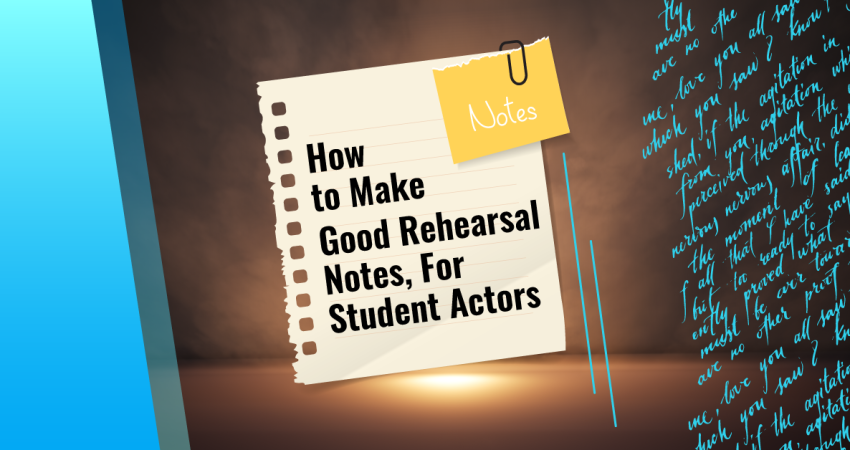As a director, I cannot stress enough to my students how frustrating it is to have to hit the same mark over and over again during rehearsals. I feel like I’m not being listened to and it’s a waste of time. Plus, I know how frustrating it is for my students to hear the same note over and over again. For students, it can feel like they’re being picked on or pissed off, and they may eventually stop trying. How can you mitigate this problem? Teaching students how to make good revision grades!
It is so satisfying to look over a script that has been marked, noted and put to good use. After all, the script is an actor’s tool, and tools are meant to be used. They are not meant to stay as clean as the day they are shared. And it’s equally frustrating to find not only a script left behind after rehearsal, but one that looks like it’s barely been opened, let alone written.
Writing notes on a script not only helps identify who the script is for (hot tip, students: write your name on the face of your script!), but it also shows that the student is putting thought and effort into their performance on stage.
There are a lot of different ways that student actors can take notes for rehearsals, and there is no right way.* But there is one wrong way – not to take notes at all. Any grade is better than no grade. In the end, the best grades are those that the student understandthat they will rememberand that they will apply to their performances.
Here are the top seven note-taking tips to share with your acting students. There is a printable version available below so you can print out the tips and hand them out to your students at your next rehearsal.
1. Write physical notes in your script. Always use a pencil – the director may ask you to change something later. Physically writing notes will help them stick in your brain – it’s all about muscle memory. If you type faster, you can try making notes on your phone or dictating notes into a voice recorder app. However, be sure to go back and manually copy all the digital notes into the script. (Many directors don’t allow phones in rehearsal, so get into the habit of writing your rehearsal notes by hand.)
2. Don’t rely on your memory. Make notes as you receive them. If you try to remember them for later, you won’t. Yes, eventually you have to memorize your lines and cues, but when you first hear your notes and do the initial work, make life easy and write down your notes right away so you don’t forget them.
3. Be precise. Write notes where it happens in the script. For example, if you enter the middle of someone’s line, make a sign (such as a circle or an arrow) exactly as you enter.
4. Write notes that make sense to you. You can choose to write full, descriptive sentences or use the abbreviation (eg XDS for cross down). You can draw pictures or diagrams where you need to move. You’re the one who has to understand and apply the notes, so try different approaches until you find a note-taking system that works for you.
5. When you receive footnotes, circle or underline the words you missed, so you can make sure your lines are word-perfect as you revise. You may also find it helpful to circle or underline a few key words in your scene partner’s cue lines to help jog your memory.
6. If you are performing in a musical, be sure to take notes on the music and choreography, even if there are rehearsal recordings. Circle your harmony notes and write or draw a basic outline of your movements and note where they appear in the script.
7. During a post-run notes session, listen to everyone’s notes, not just your own. You may find that you can also apply certain grades others receive to your performance. Write down everything your manager mentions multiple times – clearly it’s something they think is important. Treat a notes session like a free acting masterclass – the information is there, so use it!
Again, the best grades are those that the student understandthat they will rememberand that they will apply to their performances. You may have to verbally remind students to take notes, provide them with pencils to write with, and give up precious minutes of rehearsal time for students to write notes in their scripts. However, getting students used to making revision notes will only be a benefit – less stress, less frustration and more confident performance.
* Remember this is for student actors — a stage manager (whether student or staff) needs to have very clear notes so anyone can pick up their binder promptly and call the show from it. Check out our post How to Prepare a Stage Manager’s Prompt Book for more on that.
Additional resources:
Click here for a free printable tip sheet.
Kerry Hishon is a director, actor, writer and stage fighter from London, Ontario, Canada. She blogs at www.kerryhishon.com.
Want to learn more about our newest pieces, resources, and giveaways?
Get on our list!

